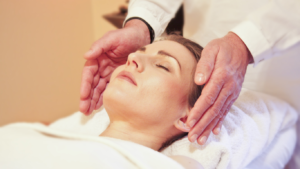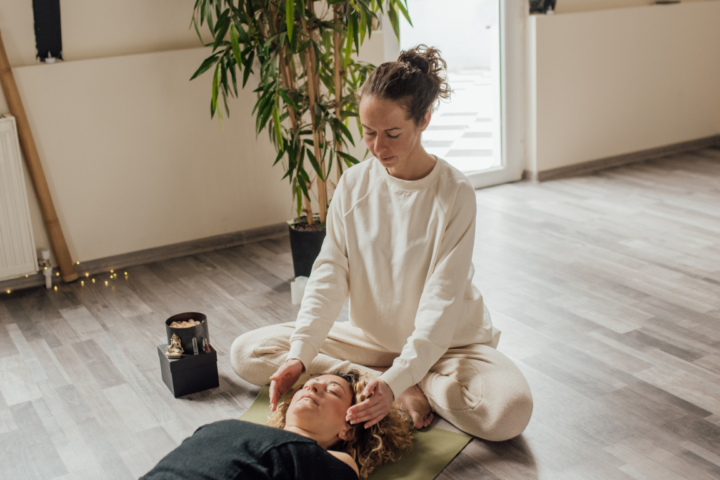- Facebook0
- Twitter0
- Google PLuse0
- 0Shares
- 16 Views
Reiki Healing: A Holistic Approach to Wellness
Reiki Healing
Reiki, derived from the Japanese words “Rei” (universal) and “Ki” (life energy), is a spiritual healing practice that channels energy to balance the body, mind, and spirit. This alternative therapy is rooted in ancient practices and has gained global popularity as a gentle yet powerful approach to achieving holistic wellness.

What is Reiki Healing?
Reiki is a non-invasive, hands-on (or hands-off) healing technique. Practitioners believe that every living being possesses a life force energy, which flows through the body. When this energy becomes imbalanced or blocked due to stress, trauma, or illness, it can lead to physical, emotional, or mental health challenges.
Reiki healing works by directing universal energy through the practitioner’s hands to the recipient, restoring the natural flow of energy and promoting self-healing. The practice is based on the idea that by harmonizing the life force energy, the body can heal itself more effectively.
The Principles of Reiki
Reiki is more than just a healing technique; it’s a philosophy grounded in five guiding principles:
- Just for today, I will not be angry.
- Just for today, I will not worry.
- Just for today, I will be grateful.
- Just for today, I will do my work honestly.
- Just for today, I will be kind to every living thing.
These principles encourage mindfulness and a positive outlook on life, forming the foundation of Reiki practice.
How Does Reiki Work?
- Preparation:
- A typical Reiki session begins with the recipient lying down or sitting comfortably. It is not necessary to remove clothing, as Reiki energy flows through all materials.
- Energy Scanning:
- The practitioner uses their hands to sense areas of the body with energy imbalances or blockages.
- Channeling Energy:
- The practitioner gently places their hands on or above specific areas of the recipient’s body. Universal energy flows through the practitioner into the recipient, promoting relaxation and healing.
- Holistic Focus:
- Reiki works on multiple levels—physical, emotional, mental, and spiritual—to address the root cause of issues rather than just the symptoms.
- Closing and Grounding:
- The session ends with a grounding process, ensuring that both the recipient and practitioner feel balanced and centered.
Benefits of Reiki Healing
- Stress Reduction and Relaxation:
- Reiki induces a deep state of relaxation, helping to reduce stress and tension.
- Emotional Balance:
- By clearing blocked energy, Reiki helps release negative emotions and promotes emotional resilience.
- Pain Relief:
- Many recipients report relief from chronic pain, migraines, and other physical discomforts after Reiki sessions.
- Improved Sleep:
- The calming effects of Reiki often lead to better sleep quality and patterns.
- Enhanced Self-Healing:
- Reiki strengthens the body’s natural ability to heal itself by restoring balance and harmony.
- Spiritual Growth:
- For many, Reiki serves as a pathway to spiritual awakening and personal growth, fostering a deeper connection with the universe.
Who Can Benefit from Reiki?
Reiki is suitable for people of all ages and backgrounds. It can complement conventional medical treatments, making it a popular choice for those dealing with:
- Chronic illnesses
- Stress and anxiety
- Post-surgical recovery
- Emotional trauma
- Fatigue or low energy
Reiki is also effective for animals and plants, as they too have life force energy that can benefit from balancing.
How to Learn Reiki
Reiki is accessible to anyone willing to learn. Training is typically divided into three levels:
- Level 1 (Shoden):
- Focuses on self-healing and practicing Reiki on others.
- Level 2 (Okuden):
- Introduces symbols and techniques for deeper healing and distant Reiki.
- Level 3 (Shinpiden):
- The Master level, for those who wish to teach and fully integrate Reiki into their lives.
Training involves attunements from a certified Reiki Master, enabling students to channel Reiki energy.
Dont Miss: Is Marriage Predestined or Self-Made?
Myths and Misconceptions About Reiki
- “Reiki is a Religion”:
- While Reiki has spiritual elements, it is not tied to any religion and welcomes people of all beliefs.
- “Reiki Cures Everything”:
- Reiki complements medical treatments but is not a replacement for professional healthcare.
- “Practitioners Use Their Own Energy“:
- Practitioners channel universal energy, not their personal energy, ensuring they remain balanced.
Practicing Reiki in Daily Life
Even without formal training, anyone can adopt Reiki principles to lead a balanced life. Practices like mindfulness, gratitude, and positive affirmations align with Reiki’s philosophy and contribute to holistic well-being.
Reiki healing is a gentle yet profound practice that addresses the root causes of imbalance, paving the way for physical, emotional, and spiritual harmony. Whether as a recipient or practitioner, embracing Reiki can lead to a healthier, more connected life.





One Reply to “Reiki Healing: Unlock the Energy to Heal and Thrive”